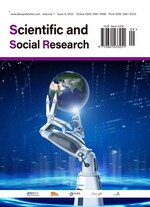An Investigation and Analysis of Linguistic Landscape in Wufu Town, Wuyishan City
Abstract
As a renowned historical and cultural town in Fujian Province, Wufu Town is experiencing vigorous development in its cultural tourism industry, thanks to the implementation of the rural revitalization strategy. Besides performing the basic function of information transmission, the linguistic landscape of Wufu Town carries rich historical and cultural connotations. It also reflects the construction progress and development trend of Wuyi Mountain’s cultural tourism industry. Through field research, including photographing, recording, and interviewing the linguistic landscape of Wufu Town, combined with quantitative and qualitative analysis of the survey results, it can be found that there are issues such as irregular use of language and script, inaccurate translation codes, and untimely repairs of damaged or obscured linguistic landscapes in Wufu Town. By analyzing the causes of related problems, the author provides feasible suggestions from three perspectives: language and literacy accomplishment, linguistic landscape serviceability, and local cultural heritage protection. These aim to improve local linguistic landscape management, enabling the historical charm of Wufu Town to integrate more closely with modern development.
References
Fujian Provincial Department of Culture and Tourism, 2024, Announcement on the list of “Gold Medal Tourism Villages” and “All-for-one Ecotourism Towns” in Fujian Province in 2024.
Yang SY, 2022, Decoding and Reconstruction of Traditional Settlement Cultural Landscape Genes, thesis, Fujian Agriculture and Forestry University. https://doi.org/10.27018/d.cnki.gfjnu.2022.000698
Fan GS, 2014, The Connotation and Modern Implication of Chinese Traditional Confucian Filial Piety and Integrity. Lanzhou Academic Journal, 2014(8): 79–83.
The State Council, 2014, Regulations on the Use of Standardized Chinese Characters in the Law of the People’s Republic of China on the National Common Language and Script. People’s Political Forum, 2014(11): 37.
Ren K, 2024, The “Cultural Function” of Linguistic Landscape. Cultural Industry, 2024(23): 113–115.
Li WT, Chu JZ, 2024, The Reality and Optimization Strategy of Rural Linguistic Landscape from the Perspective of Harmonious and Beautiful Villages. Rural Discourse, 2024(3): 92–97.
Li QW, 2024, Manifestation, Dilemma, and Countermeasures of Farmers’ Subjectivity in Rural Cultural Revitalization. Smart Agriculture Guides, 4(14): 159–163. https://doi.org/10.20028/j.zhnydk.2024.14.040
Chen B, 2018, Weakening of Public Cultural Space: The “Soft Spot” of Rural Cultural Revitalization. People’s Thesis Network. http://www.rmlt.com.cn/2018/0803/524951.shtml
The Central Committee of the Communist Party of China and the State Council, 2018, The Central Committee of the Communist Party of China and the State Council issued the “Rural Revitalization Strategic Plan (2018–2022)” https://www.gov.cn/zhengce/2018-09/26/content_5325534.htm
Gao RW, Dong H, 2024, Organization, Interests and Emotions: Practical Paths for Governance Communities to Promote Comprehensive Rural Revitalization — Based on Empirical Cases from H Town, Guizhou Province. Journal of Northwest A&F University (Social Science Edition), 2024(3): 30–38.
Wu YZ, Zhou XE, 2024, Service, Culture and Aesthetics: A New Path for the Construction of Rural Tourism Linguistic Landscape in Guizhou Ethnic Regions. Guizhou Ethnic Studies, 45(1): 135–141. https://doi.org/10.13965/j.cnki.gzmzyj10026959.2024.01.019

